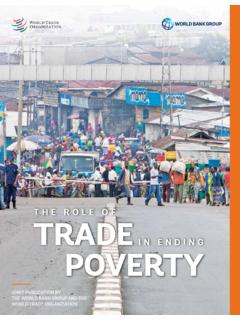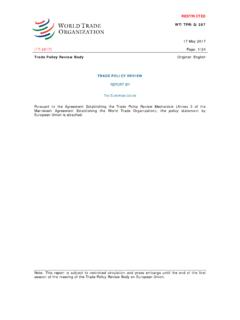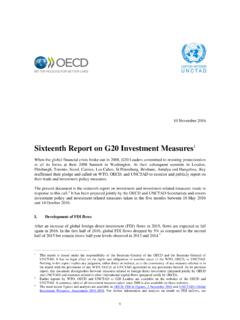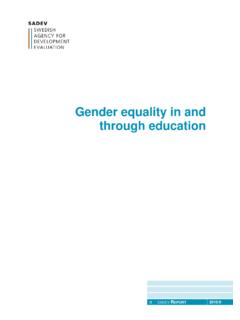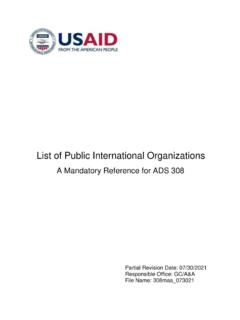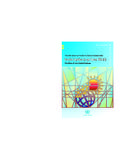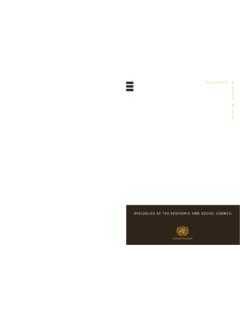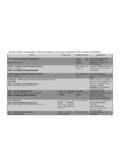Transcription of World Trade Report 2020: Government policies to promote ...
1 2020 World Trade Report Government policies to promote innovation in the digital ageWorld Trade Report 2020In the digital age, a growing number of governments have adopted policies aimed at boosting growth through innovation and technological upgrading. The World Trade Report 2020 looks at these trends and at how Trade and the WTO fit with them. A defining feature of Government policies adopted in recent years has been their support of the transition towards a digital economy. Trade and Trade policies have historically been important engines for innovation. In particular, the multilateral trading system has contributed significantly to the global diffusion of innovation and technology by fostering predictable global market conditions and by underpinning the development of global value chains. As data become an essential input in the digital economy, firms rely more on intangible assets than on physical ones, and digital firms are able to reach global markets faster without the amount of physical investment previously necessary in other sectors.
2 Success in the digital economy will depend on openness, access to information and communication technology (ICT) goods and services, collaboration on research projects, and the diffusion of knowledge and new World Trade Report 2020 shows that there is a significant role for international cooperation to make the pursuit of digital development and technological innovation more effective, while minimizing negative spill-overs from national policies . The WTO agreements, reached a quarter of a century ago, have proved to be remarkably forward-looking in providing a framework that has favoured the development of ICT-enabled economies across all levels of development . Further international cooperation at the WTO and elsewhere would enable continued innovation and reduce Trade tensions to help international markets function more 978-92-870-5045-8 World Trade Report 2020 Government policies to promote innovation in the digital ageWhat is the World Trade Report ?
3 The World Trade Report is an annual publication that aims to deepen understanding about trends in Trade , Trade policy issues and the multilateral trading is the 2020 Report about?The 2020 World Trade Report looks at the role of innovation and technology policies in an increasingly digitalized World economy, and explains the role of the WTO in this changing out moreWebsite: enquiries: +41 (0)22 739 51 11 World Trade Organization154, rue de LausanneCH-1211 Geneva 2 SwitzerlandTel: +41 (0)22 739 51 PublicationsEmail: Online designed by by the World Trade credits:Cover: 14-15: Getty 22-23: 78-79: Getty Images/Monty 128-129: iStock/sanjeri. World Trade Organization 2020 Print ISBN ISBN by the World Trade and Disclaimer 2 Abbreviations and symbols 3 Foreword by Deputy Directors-General Agah, Brauner, Wolff and Yi 4 Executive summary 6 A.
4 Introduction 14 1. A new wave of Government policies 16 2. Government policies redux 16 3. Government policies are as old as industrialization 17 4. Maximizing positive spill-overs while minimizing the negative ones the critical role of international cooperation 19 B. Defining innovation-oriented Government policies and their evolution in the digital age 22 1. Introduction 24 2. A new wave of Government policies : when, where, what? 24 3. Mapping Government policy instruments in the digital era: old tools, new tools 49 4. Conclusions 75 C. Innovation policy, Trade and the digital challenge 78 1. Introduction 80 2. The rationale for innovation policy in the digital era 83 3. The determinants of innovation in the digital era 92 4. Cross-border effects of innovation policies 117 5.
5 Conclusions 123 D. international cooperation on innovation policies in the digital age 128 1. Introduction 130 2. The existing framework of international cooperation 130 3. Do we need more cooperation on innovation policies in the digital age? 156 4. Conclusions 171 Opinion pieces Justin Yifu Lin, Industrial policy revisited 26 Mariana Mazzucato, Mission-oriented innovation and industrial policy 101 Emily J. Blanchard, Education and health as industrial policy 111 Dani Rodrik, Industrial policy, innovation and global rules 162 Bibliography 176 Technical notes 193 List of figures, tables and boxes 198 WTO members 201 Previous World Trade Reports 202 CONTENTS1 World Trade Report 20202 DisclaimerThe World Trade Report and its contents are the sole responsibility of the WTO Secretariat, except for the opinion pieces, which are the sole responsibility of their authors.
6 The Report does not reflect the opinions or views of members of the WTO. The authors of the Report also wish to exonerate those who have commented upon it from responsibility for any outstanding errors or World Trade Report 2020 was prepared under the general responsibility of Xiaozhun Yi, WTO Deputy Director-General, and Robert Koopman, Director of the Economic Research and Statistics Division. The Report was coordinated by Marc Auboin and Ankai Xu. The authors of the Report are Marc Auboin, Marc Bacchetta, Cosimo Beverelli, Eddy Bekkers, Kian Cassehgari Posada, Emmanuelle Ganne, John Hancock, Kathryn Lundquist, Gabrielle Marceau, Jos -Antonio Monteiro, Roberta Piermartini, Stela Rub nov , Victor Stolzenburg, Ankai Xu and Qing Ye (Economic Research and Statistics Division).
7 Several divisions in the WTO Secretariat provided valuable inputs and comments on drafts. In particular, written contributions were provided by colleagues from the Agricultural and Commodities Division (Rolando Alcala, Christiane Wolff), the development Division (Th o Mbise, Michael Roberts), the Intellectual Property, Government Procurement and Competition Division (Roger Kampf, Wolf Meier-Ewert, Anna Caroline M ller and Antony Taubman), the Legal Affairs Division (Jenya Grigorova), the Market Access Division (Helen Chang, Mark Henderson, Dolores Halloran, Darlan Marti, Roy Santana and Xiaobing Tang), the Rules Division (Quentin Baird, Seref Coskun), the Trade and Environment Division (Lauro Locks, Devin McDaniels)
8 , the Trade in Services and Investment Division (Antonia Carzaniga, Juan Marchetti and Lee Tuthill) and the Trade Policy Review Division (Antonia Diakantoni, Peter Pedersen). Trineesh Biswas from the Office of the Director-General provided valuable advice and contributions were received from Emily Blanchard (Dartmouth College), Justin Yifu Lin (Peking University), Mariana Mazzucato (University College London), and Dani Rodrik (Harvard University). The following individuals from outside the WTO Secretariat also provided useful comments on early drafts of the Report : Amrit Abahri, Reda Cherif, Dan Ciuriak, Simon Evenett, Caroline Freund, Anabel Gonz lez, Fuad Hasanov, Beata Javorcik, Eun-Ju Kim, Tabitha Kiriti, Zonglai Kou, Nathan Lane, Mia Mikic, Julia Nielson, Delei Peng, Boopen Seetanah, Wilma Viviers, Sacha Wunsch-Vincent and Lei assistance was provided by Razi Iqbal, Hemanth Kalathuru, Raghav Kapur, Maxime Ladri re, Shelley Moore, Daniil Orlov and Alvin Wang.
9 Additional charts were provided by Florian Eberth and Simon text production of the Report was managed by Anne Lescure and Diana Dent of the Economic Research and Statistics Division. The production of the Report was managed by Anthony Martin and Helen Swain of the Information and External Relations Division. Helen Swain edited the Report . Gratitude is also due to the translators in the Language and Documentation Services Division for the high quality of their AND SYMBOLSA bbreviations and symbolsAD antidumpingAI artificial intelligenceAPEC Asia-Pacific Economic CooperationASEAN Association of Southeast Asian NationsBEPS base erosion and profit-shiftingCARICOM Caribbean CommunityCPTPP Comprehensive and Progressive Agreement for Trans-Pacific PartnershipCVD countervailing dutiesEAEU Eurasian Economic UnionECIPE European Centre for international Political Economy EEA European Economic AreaFDI foreign direct investmentFTA free Trade agreementGATS General Agreement on Trade in ServicesGATT General Agreement on Tariffs and TradeGBARD Government budget allocations for R&DGDP gross domestic
10 ProductGNP gross national productGPA WTO Government Procurement AgreementGPT general-purpose technologyICT information and communication technologyIEC international Electrotechnical CommissionIoT Internet of ThingsIP intellectual propertyIPA investment promotion agencyISO international Organization for StandardizationISP internet service providerIT information technologyITA WTO Information Technology AgreementITC international Trade CentreITU international Telecommunication UnionLDC least developed countryLLU local loop unbundlingMERCOSUR Southern Common MarketMFN most-favoured nationMNC multinational corporationMSME micro, small and medium-sized enterpriseOECD Organisation for Economic Co-operation and DevelopmentPPE personal protective equipmentR&D research and developmentRTA regional Trade agreementSCM subsidies and countervailing measuresSEZ special economic zoneSME small and medium-sized enterpriseSOE state-owned enterpriseSTEM science, technology, engineering and mathematicsTBT technical barriers to tradeTPR Trade Policy ReviewTRIMS Agreement on Trade -Related Investment MeasuresTRIPS Trade -Related Aspects of Intellectual Property RightsUNCTAD United Nations Conference on Trade and DevelopmentUNECE United Nations Economic Commission for EuropeUNEP United Nations Environment ProgrammeUNESCO United Nations Educational.
